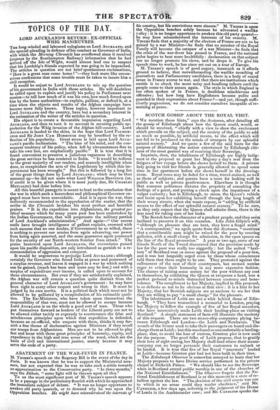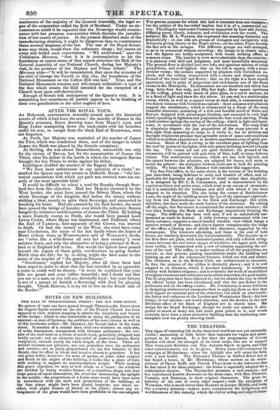SCOTCH GOSSIP ABOUT THE ROYAL VISIT.
" WE mention these hints," says the Scotsman, after detailing all the gossip of Edinburgh about how the Queen could, would, or should be received, "chiefly with a view to show the excitement which prevails on the subject, and the anxiety of the public to add as much as possible, by artificial means, to the effect which will not fail to be produced on the minds of strangers by our splendid natural scenery." And we quote a few of the said hints for the purpose of illustrating the notion entertained by Edinburgh citi- zens of the most genteel way of receiving their Sovereign.
Imprimis, then, the inhabitants of Edinburgh are highly indig- nant at the proposal to grant her Majesty a day's rest from the fatigues of her voyage before she shows herself to them. A private lady going to visit her friends is generally allowed to spend some time in her apartment before she shows herself in the drawing- room. Royal roses may be faded for a time, travel-stained, as well
as those of subjects ; and queens have a taste for looking well in public as well as private gentlewomen. Elsewhere it is thought"
that common politeness dictates the propriety of consulting the
feelings of a guest, and putting a check upon the impatience of a vulgar curiosity ; but in Edinburgh, to stoxm the Queen's vehicle
and insist upon her exhibiting herself through the long length of their weary streets, when she wants repose, is "adding by artificial means to the effect of our splendid natural scenery." To be sure, as they only expect that the Queen shall admire them, there is the less need for taking care of her looks. • I The Scotch have thecharacter of a iirudent people, and they seem inclined to preserve it on this occasion. Like John Gilpin's wife, "although on pleasure they are bent, they have a frugal mind."
"A correspondent," we again quote from the Scotsman, "mentions that a considerable sum might be raised for the poor by erecting'
galleries, with a small charge for admission, in the open spaces on the line of the Royal procession." A year or two ago, sonic of our friends North of the Tweed discovered that the provision made by law for the poor was really too niggardly : but the united " hen-
tors " of Scotland rose en masse against the proposal of a poor-law, and it was but languidly urged even by those whose consciences
told them that there ought to be one. They protested against the callousness of the rest of their countrymen, but seemed nowise eager to evince their humanity in any more expensive fashion. The chance of raising some money for the poor without any cost
to themselves, by exhibiting the Queen at twopence a head, was a perfect godsend to minds distracted between economy and bene- volence. The compliment to her Majesty, implied in this proposal, is so delicate as not to be obvious at first view : it is a hint to her Majesty, that her Scottish subjects are so anxious to see her that they are willing to pay "a small charge" for the pleasure.
The inhabitants of Leith are not a whit behind those of Edin- burgh. "They have transmitted a memorial to London, praying her Majesty to follow the example of five of her Royal ancestors, who have successively made Leith their landing-place on visiting Scotland." A simple statement of facts will illustrate the modesty of this request. There are two steam-ship companies plying be- tween Edinburgh and London—the Leith and Newhaven. The vessels of the former used to take their passengers on board and dis- charge them at Leith ; but this was found so uncomfortable a landing- place, that, to avoid the loss of custom, Grantou pier is now used for the purpose. The good folks of Leith propose, that to gratify their love of sight-seeing, her Majesty shall land where their steam- company can no longer persuade their customers to embark or be landed. It is true that five of her Royal "ancestors" landed at Leith—because Granton pier had not been built in their time. The Edinburgh Observer is somewhat annoyed to learn that her Majesty proposes to have Divine service performed in the private
chapel at Dalkeith Palace. "We should like to see the Sovereign when in Scotland attend public worship in one of the churches of the National Establishment." The Observer forgets that the Na- tional Establishment of Scotland is at this moment in a state of re- bellion against the law. " Thealecision of the civil courts was one to which in no sense could they render obedience," said Mr. CANDUSH, a few days ago, referring to the judgment of the House of Lords in the Auchterarder case ; and Mr. CANDLISH speaks the sentiments of the majority of the General Assembly, the legal or- gan of the corporation called the Kirk of Scotland. Under no cir- cumstances could it be expected that the Sovereign would counte- nance with her presence conventicles which disclaim the jurisdic- tion of her courts of justice. In the present disturbed state of the manufacturing-districts, it might be dangerous thus to countenance these avowed despisers of the law. The sun of the Royal favour, some may think, would thaw the refractory clergy ; but omens on every side forbid such expectations. "We understand," says the Caledonian Mercury, "that it is in contemplation to lay the foundation or corner-stone of that superb structure the Hall of the General Assembly of our National Church, during her Majesty's visit, in the presence of her Majesty and Prince Albert." The Mercury adds—" It will be remembered, that upon the occasion of the visit of George the Fourth to this city, the foundation of the National Monument on the Calton Hill was laid." True, and the National Monument remains and will remain unfinished—a type of the fate which awaits the Hall intended for the reception of a Church bent upon self-destruction.
Enough of Scotch talk anticipatory of the Queen's visit. It is astonishing how unanimous all parties appear to be in thinking of their own gratification to the utter neglect of hers.



























 Previous page
Previous page